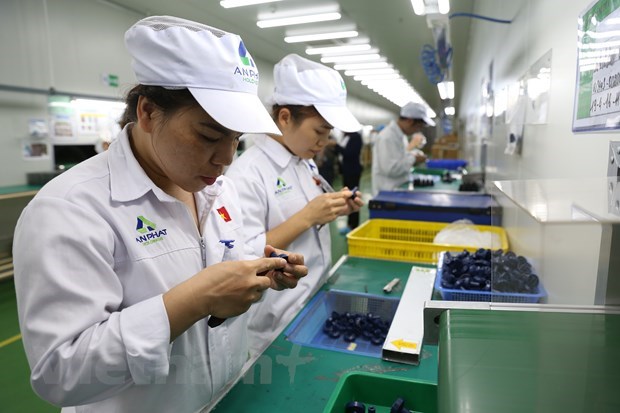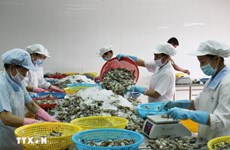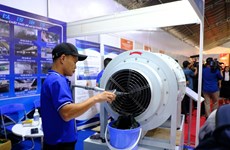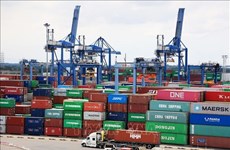EVFTA opens up opportunities for investment, restructuring global value chains
 Businesses invest in technology to seize opportunities from new FTAs (Photo: VietnamPlus)
Businesses invest in technology to seize opportunities from new FTAs (Photo: VietnamPlus)
Hanoi (VNA) – The European Union-Vietnam Free Trade Agreement (EVFTA) officially took effect on August 1, ushering in a new chapter in economic and trade relations between the two sides.
Especially, with the approval of the deal, the European Union (EU) – a demanding market with the world’s highest standards, officially recognised Vietnam’s efforts in reforms, building market economic institutions and sustainable development. The move also showed the EU’s determination to step up cooperative ties with the Southeast Asian country.
Dr. Nguyen Dinh Cung said the EVFTA is also a factor encouraging investors, especially multinational groups, to select Vietnam as a destination for investment and restructuring global value chains.
Like any other free trade agreements, under the EVFTA, the two sides committed to opening their markets for each other. The level of tax reduction towards the removal and application of 0 percent tariffs to almost all Vietnamese exports to the EU proved the latter’s commitment to actually open its market for Vietnam, he said.
For Vietnam, due to its lower competitive capacity, the country has more time to open its market for the EU. The fact will create equal competition for Vietnamese businesses and also offer them opportunities.
The EU currently is the second export market of Vietnam though it is not in the top import markets of the Southeast Asian country, Cung said.
The flow of EU investment into Vietnam is now lower than those from many Asian countries, but the deal is expected to help more Vietnamese products to penetrate the EU market, he said, adding that it is also hoped to help Vietnam to import more materials, machines and equipment, especially technologies, and draw more investment from the bloc.
The new generation FTA offers commitments to not only trade and investment, but also state-owned enterprises (SOEs), government procurements and sustainable trade, Cung said, noting these commitments are both pressure and driving force for Vietnam to accelerate reforms.
Private enterprises of Vietnam are also expected to benefit from the EVFTA, he added.
According to the expert, Vietnam has taken full advantage of free trade agreements the country has signed with partners, clearly shown in the two-digit growth of its export turnover over the past years.
However, foreign investors in Vietnam have outperformed domestic businesses in making the most of these free trade agreements, Cung stressed.
 Dr. Nguyen Dinh Cung (Photo: VietnamPlus)
Dr. Nguyen Dinh Cung (Photo: VietnamPlus)But more importantly, the EVFTA is expected to help Vietnam speed up its institutional reforms. This time, the institutional reforms does not aim to meet the deal’s requirements like when Vietnam joined the World Trade Organisation (WTO), but to boost the development of the Vietnamese business community, especially private enterprises.
Under the EVFTA’s provisions, Vietnam will find it hard to exports products to the EU market if they are not produced in an environmentally-friendly way with social responsibility or without using employees meeting international standards, Cung noted.
Therefore, domestic businesses must change their ways of production, he said, stressed that sectors and localities should directly support the business community to help them change their awareness and ways of production to meet the requirements of the market so that Vietnam and its enterprises can take full advantage of opportunities offered by the EVFTA.
Regarding COVID-19, Cung said the pandemic has brought about global impacts, even stronger effects in developed nations. The world’s demand has declined, directly affecting exports and overseas investment.
In the short term, if COVID-19 is yet to be controlled in countries across the world, Vietnam’s export growth will fall short of expectations like before the pandemic broke out, the expert said.
However, Cung said, there will be opportunities in the short term as the world’s demand for essential goods. The demand for agricultural products and food which meet the market’s requirements will continue growing, he said.
Currently, businesses are restructuring global value chains while Vietnam has signed free trade agreements with important partners, including the EU, he said, stressing that it is also a factor encouraging investors, especially multinational groups, to select Vietnam as a destination for investment and restructuring their global value chains./.













